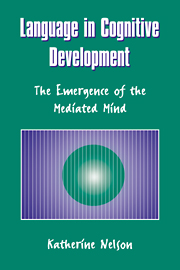Book contents
- Frontmatter
- Contents
- Preface
- I PERSPECTIVES
- 1 Language, Cognition, and Culture in Developmental Perspective
- 2 Emergence of Human Minds in Evolution and Development
- 3 Evolution and Development of the Hybrid Mind
- II DEVELOPING REPRESENTATIONAL SYSTEMS
- III DEVELOPING CONCEPTUAL SYSTEMS
- IV CONCLUSIONS
- Notes
- References
- Name Index
- Subject Index
1 - Language, Cognition, and Culture in Developmental Perspective
Published online by Cambridge University Press: 05 June 2012
- Frontmatter
- Contents
- Preface
- I PERSPECTIVES
- 1 Language, Cognition, and Culture in Developmental Perspective
- 2 Emergence of Human Minds in Evolution and Development
- 3 Evolution and Development of the Hybrid Mind
- II DEVELOPING REPRESENTATIONAL SYSTEMS
- III DEVELOPING CONCEPTUAL SYSTEMS
- IV CONCLUSIONS
- Notes
- References
- Name Index
- Subject Index
Summary
The basic premise of this book is that language is a catalyst of cognitive change during early to middle childhood. The multifunctional roles of language in cognition and communication during this important period of developmental change require deeper analysis than they have been given in contemporary theoretical writing. It is my conviction that to fulfill this goal the biological underpinnings and the sociocultural conditions of human development must be jointly analyzed in their contributions to the development of human cognition and language as a dynamic process.
Language is at the center of the theory to be outlined, because of its centrality to all of developed human life and thought. Despite the enormous place that language and its development occupy in linguistics, philosophy, and cognitive science, it is surprising how little attention is paid to language in current psychological theories of cognitive development. Relatedly, although in a different context, Wierzbicka (1994) commented: “Mainstream modern psychology … at times seems to behave as if language is irrelevant to the study of mind” (p. 431). This is particularly true in developmental psychology, where it sometimes appears that infant cognition has become the model for all human cognitive development. Why this is so doubtless has many answers implicit in the history of the field itself, as well as in cognitive science more generally.
One source of the neglect of language in cognitive development surely comes from the legacy of Piaget.
- Type
- Chapter
- Information
- Language in Cognitive DevelopmentThe Emergence of the Mediated Mind, pp. 3 - 25Publisher: Cambridge University PressPrint publication year: 1996



